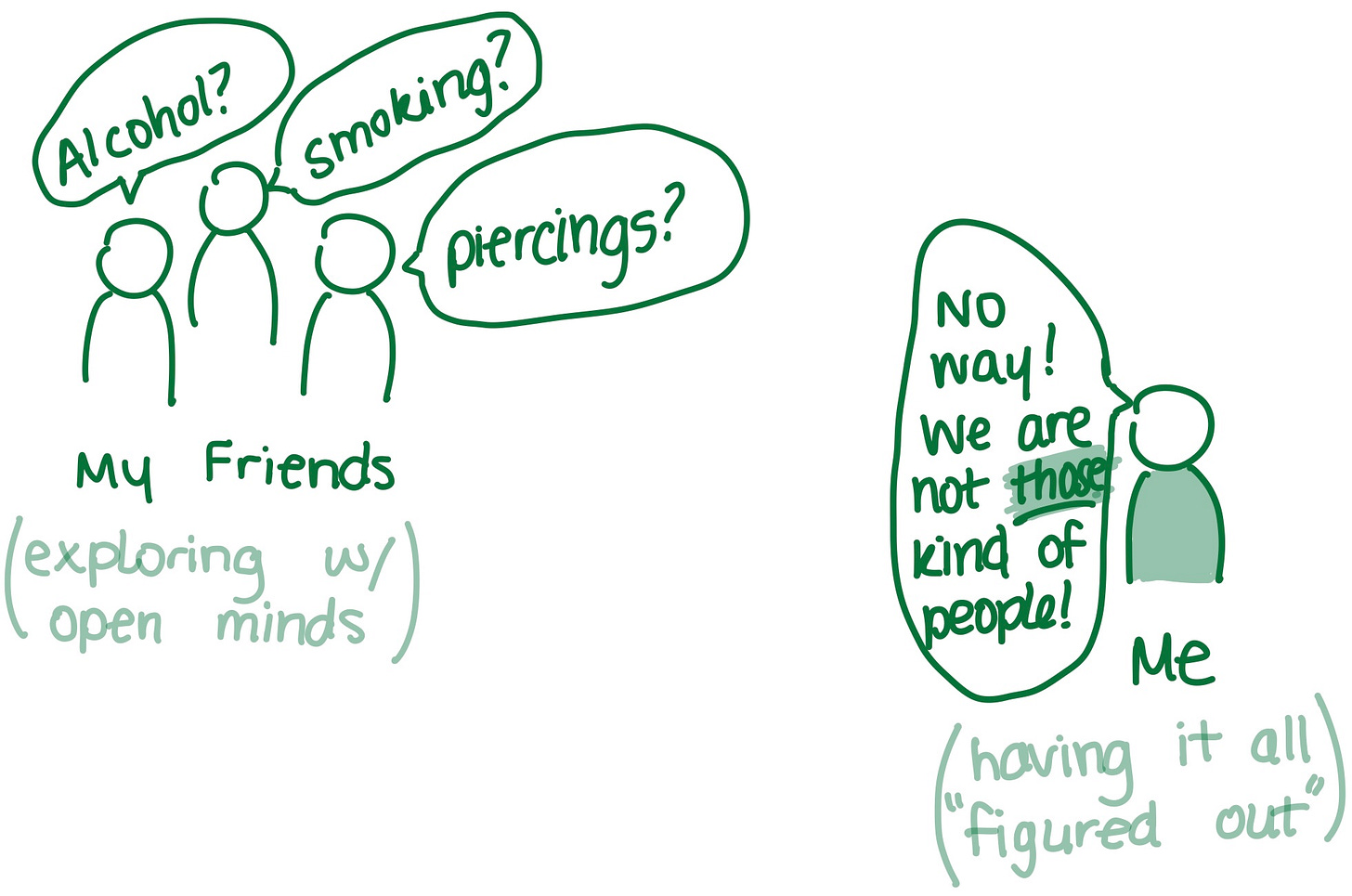Go with Your Flow
Detaching from Identity
In my last post, I discussed time as if it were a currency.
We don’t think of time as something we’re exchanging everyday or every second, but we are. We’re forced to. Such is the nature of time: it’s the only asset we can never accumulate more of.
In an effort to not waste time, I find that I’ve been over-indexing on productivity. But then, I ask myself “why do I value productivity in the first place?”
I’ve found one leading answer: identity.
Facing My Identity
My girlfriends still make fun of me for a phrase that came out of my mouth far too often back in high school, “we’re not those kind of people”:
I laugh at this younger version of myself who thought she had it all figured out. I was so judgmental. So sure of what was right and what was wrong. So sure of what would make me happy. Life was black and white.
But I didn’t start out that way.
When I was a kid, I lived in the gray areas. The in-between.
I was obsessed with performing: acting, dancing, singing — any sort of creative expression that allowed me to process the world around me. I frequently put on performances for my family, wrote scripts, and constantly roped my brother into playing make-believe.
As I grew up, I somehow internalized that this kind of creativity was nothing more than a hobby. A side gig. Tying my sense of self to creativity wasn’t a worthwhile pursuit as it could never bring me success (i.e. money and a respectable job).
This type of success could only be achieved by doing well in school. By working hard and being smart. And rejecting any opportunity that deviated from that track.
Rather than trying out for theater or taking a choir class, I pursued versions of “performing” deemed respectable and in line with a path to success.
I collected as many leadership positions as possible — Homecoming Chair, Class President, State President for a business org — all while getting A’s in my honors and AP classes. In my head, this wasn’t a path to success, it was the path to success.
And that’s the exact problem.
I developed an identity that I held onto so dearly — each piece serving as a careful step in the direction to achieving “success” as an end goal, without stopping to question what the word really even meant to me.
Then I went to college.
And I realized that my classmates had very different paths than I did. I met athletes with 4.0 GPAs, a rapper majoring in finance, pre-med students that led cultural groups on campus.
It didn’t matter how we got there; we all arrived at the same place. It made me question the things I thought were so important, or specifically needed, to achieve success.
It made me question my identity.
You > A Single Identity
Maybe your domain was different than mine, but I bet you had one. Were you a Jock? A Nerd? A Prep? A Band Geek?
Our identities form at a young age, which makes sense. When we’re growing up, we try to understand who we are and our place in the world.
But it’s strange to me that we don’t escape labels even as we mature.
In college, identity comes from Greek life or your major or the college itself. As we graduate from formal education, identity largely becomes tied to your profession or wealth. Even in something as nebulous as online writing, writers are encouraged to find a niche, and to find it fast.
These types of labels tether us to a certain version of ourselves and build a single-track identity. We lean into that identity, thinking it will serve us. But when we avoid everything that deviates from that one identity, it can be dangerous.
Our self-worth becomes entirely external, as we reject interests that fuel our soul.
Sticking to a specific identity incentivizes us to be one dimensional instead of embracing the multitude of our own character, which is unnatural and unrealistic. As complex creatures, we deserve to tap into that complexity.
Try Fluidity
If we internalize how fluid we are as beings, we can release our arbitrary ties to what we think we ought to do and explore all that we’re meant to be, ultimately allowing us to get the most out of life.
This is an idea TV/screen writer and author Jonny Sun touches on in his book of short reflections Goodbye, Again:
“Maybe the lag time between when you make something and when people see it is important, as it gives you enough time to mourn who you have preserved away before everyone else sees who that is for the first time. I don’t know that the me who is writing this right now will ever know for sure. Because by the time you read this, the person who made it will be gone.”
In one fell swoop, he both acknowledges and releases how writing this book may have reaffirmed his identity as a writer. This is rare.
Mainstream culture maybe values identity too much. Building one. Cultivating it.
But what if we were to maintain a fluid sense of self instead? One that ebbs and flows with the day’s interests, beliefs, and dreams.
//
It’s never too late to question the things you thought you knew to be true. To try on pieces of your identity that have been dormant for so long. In fact, developing a mindset where we’re comfortable trying something new (and being bad at it) is the exact thing that makes us better.
How?
When we embrace the uncertainty that comes with self-exploration we open ourselves to wonder and play, which is the topic I’ll be addressing in my next post.
Until then, much love.
Shiv
Stories by Shiv is part of Wayfinder, a writer collective exploring questions that matter


